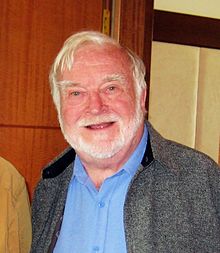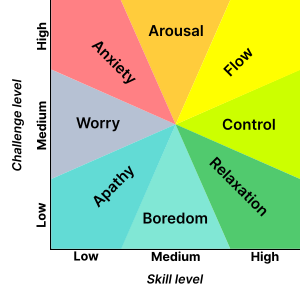From Wikipedia, the free encyclopedia/Blogger re http://wwwp2pfoundation.net/Multi-Dimensional_Science
| Mihaly Csikszentmihalyi | |
|---|---|

Csikszentmihalyi on 2010 (aged 75)
| |
| Born | September 29, 1934 (age 81) Fiume, Kingdom of Italy (now Rijeka, Croatia) |
| Known for | Flow (psychology) autotelic activities |
The native form of this personal name is Csíkszentmihályi Mihály. This article uses the Western name order.
Mihaly Csikszentmihalyi (Hungarian: Csíkszentmihályi Mihály, pronounced [ˈt͡ʃiːksɛntmihaːji ˈmihaːj] (Contents
[hide]Work[edit]
Csikszentmihalyi is noted for his work in the study of happiness and creativity, but is best known as the architect of the notion of flow and for his years of research and writing on the topic. He is the author of many books and over 120 articles or book chapters. Martin Seligman, former president of the American Psychological Association, described Csikszentmihalyi as the world's leading researcher on positive psychology.[3] Csikszentmihalyi once said: "Repression is not the way to virtue. When people restrain themselves out of fear, their lives are by necessity diminished. Only through freely chosen discipline can life be enjoyed and still kept within the bounds of reason."[4] His works are influential and are widely cited.[5]Personal background[edit]
Csikszentmihalyi immigrated to the United States from Yugoslavia at the age of 22.[citation needed] He received his B.A. in 1960 and his PhD in 1965, both from the University of Chicago.[6]Csikszentmihalyi is the father of artist and professor Christopher Csikszentmihályi and University of California, Berkeley[7] professor of philosophical and religious traditions of China and East Asia, Mark Csikszentmihalyi.[citation needed]
In 2009, Csikszentmihalyi was awarded the Clifton Strengths Prize[8] and received the Széchenyi Prize at a ceremony in Budapest in 2011.[9]
Flow[edit]
Main article: Flow (psychology)
In an interview with Wired magazine, Csíkszentmihályi described flow as "being completely involved in an activity for its own sake. The ego falls away. Time flies. Every action, movement, and thought follows inevitably from the previous one, like playing jazz. Your whole being is involved, and you're using your skills to the utmost."[12]
Csikszentmihalyi characterized nine component states of achieving flow including “challenge-skill balance, merging of action and awareness, clarity of goals, immediate and unambiguous feedback, concentration on the task at hand, paradox of control, transformation of time, loss of self-consciousness, and autotelic experience.”[13] To achieve a flow state, a balance must be struck between the challenge of the task and the skill of the performer. If the task is too easy or too difficult, flow cannot occur. Both skill level and challenge level must be matched and high; if skill and challenge are low and matched, then apathy results.[10]
One state that Csikszentmihalyi researched was that of the autotelic personality.[13] The autotelic personality is one in which a person performs acts because they are intrinsically rewarding, rather than to achieve external goals.[14] Csikszentmihalyi describes the autotelic personality as a trait possessed by individuals who can learn to enjoy situations that most other people would find miserable.[11] Research has shown that aspects associated with the autotelic personality include curiosity, persistence, and humility.[15]
Motivation[edit]
A majority of Csikszentmihalyi’s most recent work surrounds the idea of motivation and the factors that contribute to motivation, challenge, and overall success in an individual. One personality characteristic that Csikszentmihalyi researched in detail was that of intrinsic motivation. Csikszentmihalyi and his colleagues found that intrinsically motivated people were more likely to be goal-directed and enjoy challenges that would lead to an increase in overall happiness.[16]Csikszentmihalyi identified intrinsic motivation as a powerful trait to possess to optimize and enhance positive experience, feelings, and overall well-being as a result of challenging experiences. The results indicated a new personality construct, a term Csikszentmihalyi called work orientation, which is characterized by “achievement, endurance, cognitive structure, order, play, and low impulsivity." A high level of work orientation in students is said to be a better predictor of grades and fulfillment of long-term goals than any school or household environmental influence.[17]
Publications[edit]
- Csikszentmihalyi, Mihaly (1975). Beyond Boredom and Anxiety: Experiencing Flow in Work and Play, San Francisco: Jossey-Bass. ISBN 0-87589-261-2
- Csikszentmihalyi, Mihaly (1978) Intrinsic Rewards and Emergent Motivation in The Hidden Costs of Reward : New Perspectives on the Psychology of Human Motivation eds Lepper, Mark R;Greene, David, Erlbaum: Hillsdale: NY 205-216
- Csikszentmihalyi, Mihaly and Larson, Reed (1984). Being Adolescent: Conflict and Growth in the Teenage Years. New York: Basic Books, Inc. ISBN 0-465-00646-9
- Csikszentmihalyi, Mihaly and Csikszentmihalyi, Isabella Selega, eds. (1988). Optimal Experience: Psychological studies of flow in consciousness, Cambridge: Cambridge University Press. ISBN 0-521-34288-0
- Csikszentmihalyi, Mihaly (1990). Flow: The Psychology of Optimal Experience. New York: Harper and Row. ISBN 0-06-092043-2
- Csikszentmihalyi, Mihaly (1994). The Evolving Self, New York: Harper Perennial. ISBN 0-06-092192-7
- Csikszentmihalyi, Mihaly (1996). Creativity : Flow and the Psychology of Discovery and Invention. New York: Harper Perennial. ISBN 0-06-092820-4
- Csikszentmihalyi, Mihaly (1998). Finding Flow: The Psychology of Engagement With Everyday Life. Basic Books. ISBN 0-465-02411-4 (a popular exposition emphasizing technique)
- Gardner, Howard, Csikszentmihalyi, Mihaly, and Damon, William (2001). Good Work: When Excellence and Ethics Meet. New York, Basic Books.
- Csikszentmihalyi, Mihaly (2003). Good Business: Leadership, Flow, and the Making of Meaning. Basic Books, Inc. ISBN 0-465-02608-7
- Csikszentmihalyi, Mihaly (2014). The Systems Model of Creativity: The Collected Works of Mihaly Csikszentmihalyi. Dordrecht: Springer, 2014. ISBN 978-94-017-9084-0
- Csikszentmihalyi, Mihaly (2014). Flow and the Foundations of Positive Psychology: The Collected Works of Mihaly Csikszentmihalyi. Dordrecht: Springer, 2014. ISBN 978-94-017-9087-1
- Csikszentmihalyi, Mihaly (2014). Applications of Flow in Human Development and Education: The Collected Works of Mihaly Csikszentmihalyi. Dordrecht: Springer, 2014. ISBN 978-94-017-9093-2
See also[edit]
- Creativity
- Motivation
- Attention
- Psychology
- Cognitive Science
- John Neulinger
- Experience Sampling Method
References[edit]
- Jump up ^ O'Keefe, Paul A. (September 5, 2014). "Liking Work Really Matters". The New York Times. Retrieved 30 October 2015.
- Jump up ^ Csikszentmihalyi, Mihaly (1990). Flow : the psychology of optimal experience (1st ed.). New York: Harper & Row. ISBN 9780060162535.
- Jump up ^ Thinker of the Year Award
- Jump up ^ "Virtue Quotes & Quotations". focusdep.com. Retrieved 19 January 2014.
- Jump up ^ Nigel King & Neil Anderson (2002). Managing Innovation and Change. Cengage Learning EMEA. p. 82. (ISBN 1861527837)
- Jump up ^ "Mihaly Csikszentmihalyi". Claremont, CA, USA: Claremont Graduate University, Division of Behavorial and Organizational Sciences. Retrieved 3 March 2014.
B.A., University of Chicago, 1960
- Jump up ^ http://eall.wisc.edu/?q=node/28[dead link] East Asian Languages and Literature
- Jump up ^ Nakamura, Jeanne. "2009 Clifton Strength Prize Laureate". Clifton Strengths School. Retrieved June 15, 2012.
- Jump up ^ "President of Hungary honors SBOS Prof. Mihaly Csikszentmihalyi with national science prize". Claremont Graduate University. June 3, 2011. Retrieved 2012-06-15.
- ^ Jump up to: a b Csikszentmihalyi, M., Finding Flow, 1997.
- ^ Jump up to: a b c Csikszentmihalyi, M. (1990). Flow: The Psychology of Optimal Experience. New York: Harper and Row. ISBN 0-06-092043-2
- Jump up ^ Geirland, John (1996). "Go With The Flow". Wired magazine, September, Issue 4.09.
- ^ Jump up to: a b Fullagar, Clive J.; Kelloway, E. Kevin (2009). "Flow at work: an experience sampling approach". Journal of Occupational and Organizational Psychology 82 (3): 595–615. doi:10.1348/096317908x357903.
- Jump up ^ Car, A. Positive psychology. The Science of happiness and human strengths. Hove, 2004.
- Jump up ^ Csikszentmihalyi, M. & Nakamura, J. (2011). Positive psychology: Where did it come from, where is it going? In K.M. Sheldon, T. B. Kashdan, & M.F. Steger (Eds.), Designing positive psychology (pp. 2-9). New York, NY: Oxford University Press.
- Jump up ^ Abuhamdeh, Sami; Csikszentmihalyi, Mihaly (2012). "The importance of challenge for the enjoyment of intrinsically motivated, goal-directed activities.". Personality and Social Psychology Bulletin 38: 317–30. doi:10.1177/0146167211427147. PMID 22067510.
- Jump up ^ Wong, Maria; Mihaly Csikszentmihalyi (1991). "Motivation and academic achievement: The effects of personality traits and the quality of experience". Journal of Personality 59: 539–574. doi:10.1111/j.1467-6494.1991.tb00259.x.
External links[edit]
- Faculty page at Claremont Graduate University
- Brain Channels Thinker of the Year - 2000
- Mihaly Csikszentmihalyi at TED
|
Categories:
- American psychologists
- Hungarian psychologists
- American science writers
- Positive psychologists
- Creativity researchers
- Psychology educators
- Members of the Hungarian Academy of Sciences
- University of Chicago faculty
- University of Chicago alumni
- Yugoslav emigrants to the United States
- Hungarian scientists
- American people of Hungarian descent
- People from Rijeka
- 1934 births
- Living people
- Claremont Graduate University faculty

No comments:
Post a Comment